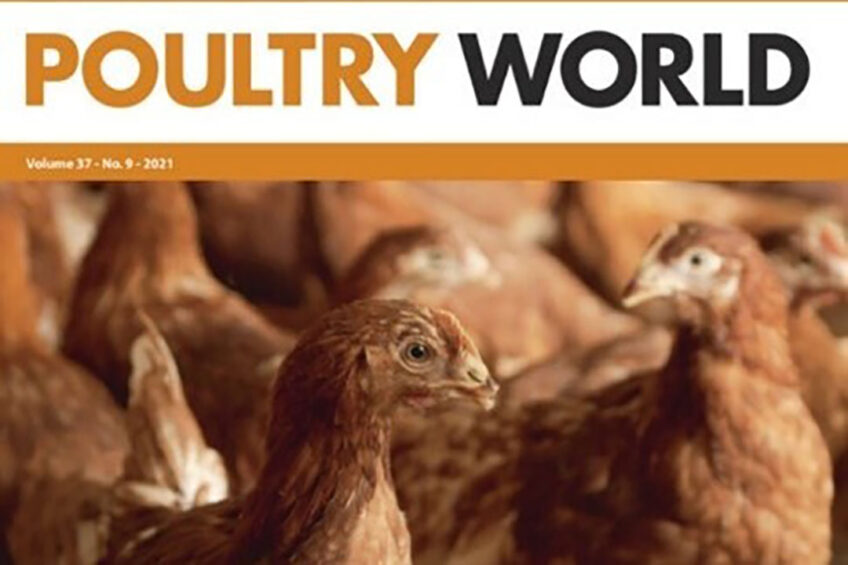Poultry World edition 9 of 2021 now online

This 9th edition of Poultry World highlights sustainability in the poultry sector. At AgriVision 2021, it was asked if it is possible to sustainably feed 10 billion people by 2050. Meanwhile, Russia’s egg industry is exploring egg processing, and the UK continues to battle with labour challenges. This edition also looks at in-ovo technology, trends in cage-free egg production, and discovers how genetic selection in ducks is being accelerated.
AgriVision 2021: Focus on sustainability
Will be possible to sustainably feed 10 billion people by 2050? This question was put forward to a global audience at the start of the online AgriVision event, which took place on 7 October 2021. Thoughts around making agricultural production more sustainable were discussed in detail.
Russian egg industry looking to diversify
To become less dependent on the very sluggish table egg market, egg farmers in Russia are looking to diversify by investing in egg processing, which currently account for only 12% of all eggs produced.

Improving broiler hatchability and performance
In-ovo technology is being adopted in several areas of poultry production. A recent study explored the benefits of in-ovo injection of microalgae (Spirulina Platensis) on hatchability, antioxidant and immunity-related gene expression, as well as the hatchling performance of broiler chicks.

Trends and challenges in cage-free egg production
Consumer concerns around bird welfare are driving many players in the egg sector to ban cage eggs from their supply chains. Furthermore, a legislative proposal will be presented by the end of 2023 to phase out, and finally ban, the use of cages for several farm animals.

Working together for success
Initiated by Cobb, the annual ‘Flock Award’ is given to top-performing companies in the North/Central America region. Sollio Agriculture-Avantis in New Brunswick and Cox Atlantic Chick Hatchery in Nova Scotia were joint winners of the 2020 award.

Closing the creatine supply gap
Only two thirds of the creatine required for maximum broiler performance is supplied by the bird’s own synthesis while the remaining third needs to be supplemented via the feed. Adding a guanidinoacetic acid supplement can close the gap.

Effective ventilation boosts safety, productivity and sustainability
Chickens are highly sensitive to temperature and so it is crucial to equip poultry houses with reliable and efficient cooling and heating systems. Controlling ventilation fans with variable speed drives can help to improve the welfare of the birds and reduce consumption by up to 40%.
Formulating broiler feeds under economic pressure
High-performing broilers require well-balanced, precise diets. Today, high feedstuff prices and limited availability mean that formulating those diets requires some creativity.

Accelerating genetic selection in ducks
Duck breeders have been anticipating the development of a microchip to determine specific traits. INRA in France has plotted multiple genetic lines and so the chip could become a reality. Grimaud Frères has now hatched its first ducklings combining traditional genetics with genomics.

Understanding the dynamics of worm infestation
Worms remain a problem in poultry production. In parent stock, the first signs of infection are lower egg production, feed intake and fertility. Worms seldom cause issues in broilers, but that could change in the near future.

Reducing environmental impact with protease
Although produced by the GIT of broilers, microbial proteases are often supplemented in feed. Protease has typically been used to reduce feed costs without compromising performance. However, proteases can also help to reduce emissions.
Bulgaria’s poultry sector optimistic despite challenges
The continuous growth of Bulgaria’s poultry sector was interrupted for the first time in 10 years in 2020, and between May 2020 and January 2021, it is estimated that production costs increased by up to 50%. However, the outlook for 2021 and 2022 remain optimistic.

Labour issues and broiler health top priorities
At the UK’s virtual Poultry Meat Conference, NFU poultry adviser, Aimee Mahony, said the UK poultry sector was facing a labour shortage crisis. St David’s Poultry team vet, Richard Jackson, discussed the increasing incidence of Transmissible Viral Proventricultitis (TVP), and spoke about avian influenza, and Jon Sargent, GM of Hay Farms, highlighted broiler management.
Oversupply and labour regional concerns in positive markets
In its latest global poultry market update, Rabobank noted that most regions are performing at breakeven levels or enjoying profitable conditions with the re-opening of economies in Europe and the Americas.

To access the magazine section, where you will find the 9th edition of Poultry World 2021 as well as other magazines from specialists in the agriculture industry, simply register for free.













